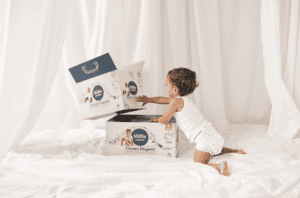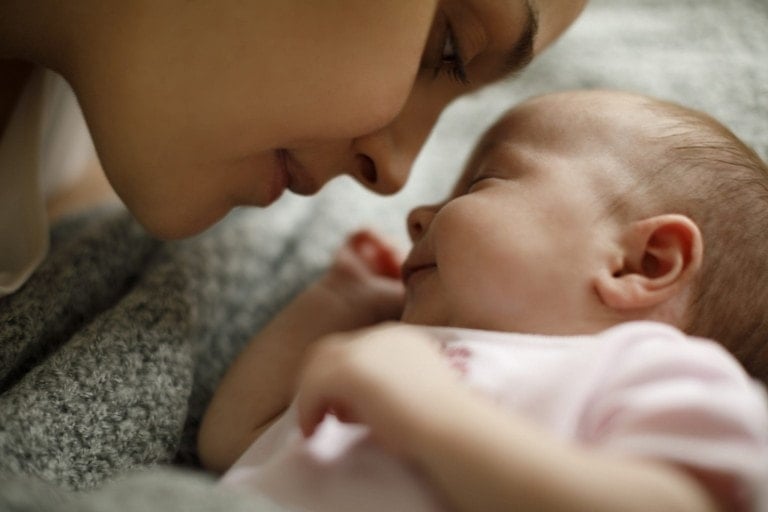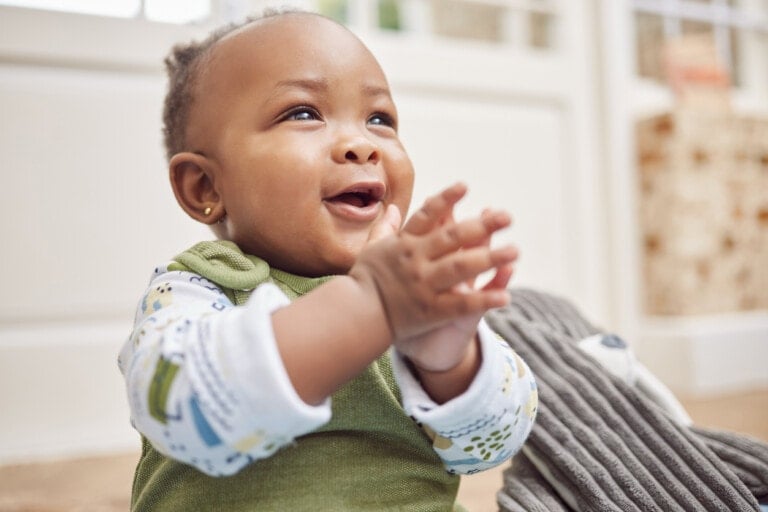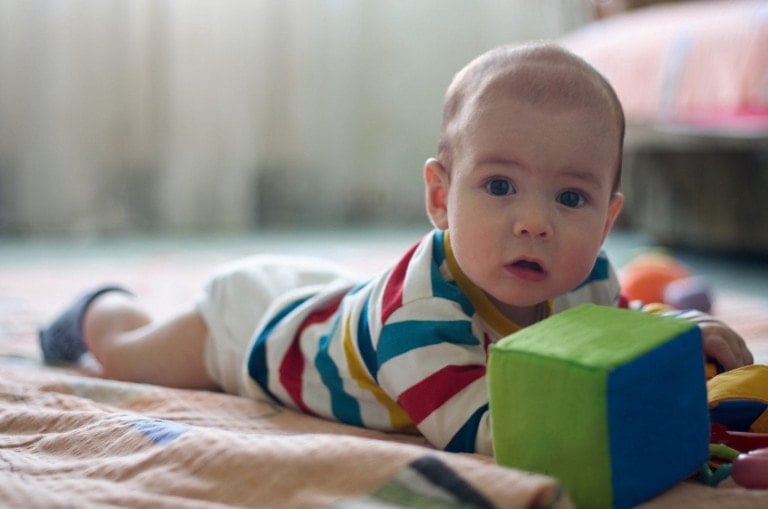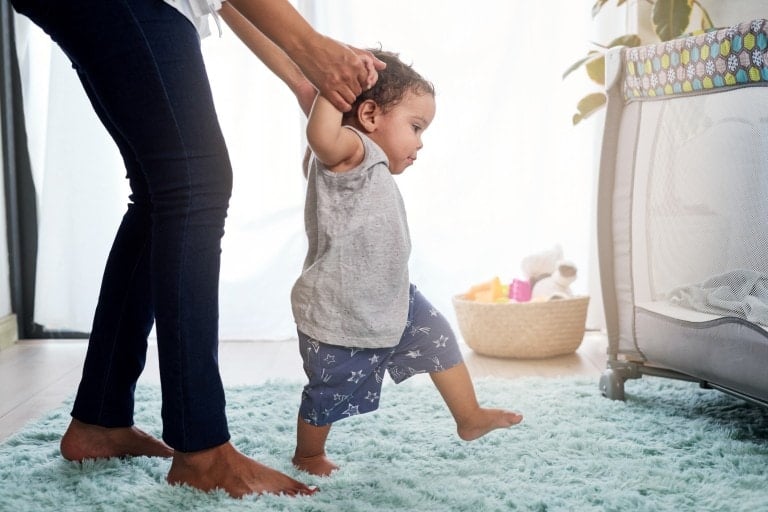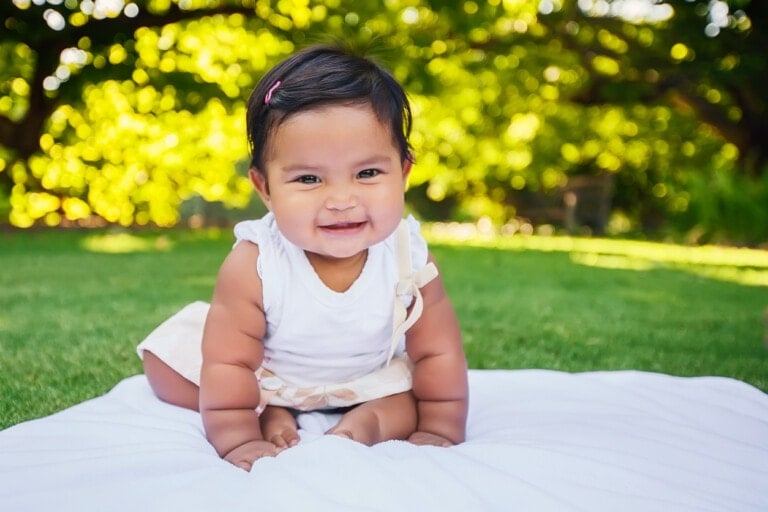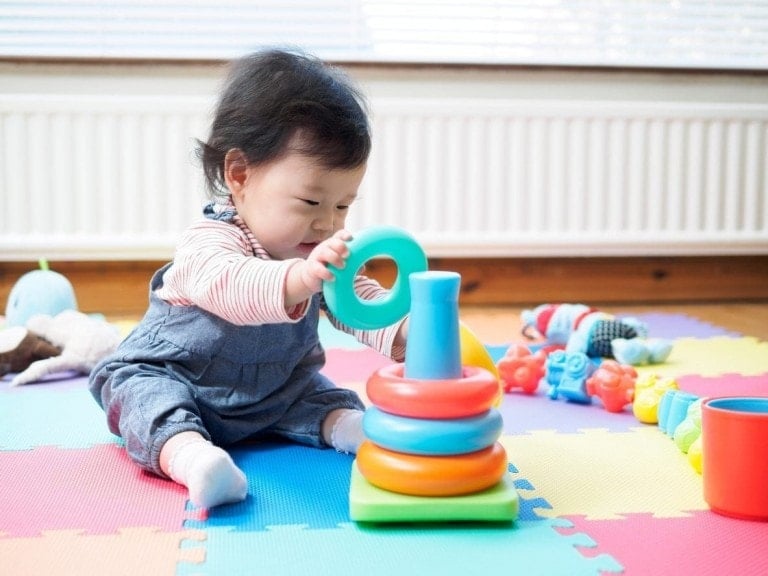We all know the most common developmental milestones — rolling, crawling, walking, etc. But what about the more subtle, less-talked-about milestones that are just as important? For example, we carefully record the date of the first step and the first word in the baby book, but what about the first time your baby notices you from across the room or picks up a Cheerio using a three-finger grasp?
I like to call these “mini-milestones.” Sometimes, babies slip them in without any fanfare, but they’re as exciting as the more common milestones! It’s time to start noticing when these occur and celebrate all the growth your child makes. Read on to learn about eight lesser-known developmental milestones.
Tips for Developmental Milestones
Before we delve into mini-milestones, we must share these tips about developmental milestones in general.
Don’t Compare Your Baby to Others
It’s important to remember that all babies are individuals and are developing at their own pace.1 Try not to compare your baby to other babies. And try not to live by the developmental milestone charts, either. Babies don’t hit milestones on the exact date the charts say they will.2 The goal is to see minor progression every week.
Make Sure They Don’t Regress or Plateau
Babies should not show regression or go backward or plateau for a long time with their skills. Of course, as your baby learns new skills, they may forget to practice an older skill. For example, perhaps your baby was rolling from front to back, but as they learn to push up on their arms and explore what’s in front of them, they forget how to roll because they are so distracted by the world they are investigating. This is common, but losing skills without developing new ones is a red flag.3
Ensure They Don’t Skip Milestones
Babies should never skip developmental milestones. Each milestone builds on the previous one, so working on each milestone is essential. For example, some babies go straight to walking without ever crawling, and parents may applaud this. Still, crawling is a critical milestone in building core strength, balance, sensory skills, and visual skills.4 If your baby skips this milestone, they lose a lot of development opportunities. This is why you must encourage every milestone along the way.
8 Lesser-Known Developmental Milestones
Now, let’s explore some of the lesser-known milestones! Having an awareness of these will ensure your baby stays on track and continues to move forward in their development.
1. Development of Depth Perception
Depth perception occurs when they’re around 5 months old. Your baby will suddenly be able to take in images far away in the landscape and be aware of how distant items are.5 You must be mindful of this and allow your baby to explore different depths. Going outside for walks and looking out windows is excellent. You can also talk to your baby from across the room and see if they look at you. Place toys at varying depths during tummy time, and note if your baby looks from one toy to another.
If you suspect issues with your baby’s vision, such as lazy eye or trouble focusing, try to address this before they’re 5 months old so their depth perception can develop correctly.
2. Fine Pincer Grasp
Around 6 months of age, your baby will use the “raking” grasp (where they use all their fingers to rake small items into their fist).6,7 Then, around 7 to 8 months, they will use the inferior pincer grasp to pick up a small item.7 Around 9 to 10 months, they use the three-finger fine pincer grasp.6 They can now oppose their thumb and use their thumb, index, and middle finger to pick up a small item. This happens fast and makes choking hazards even more hazardous. However, it allows your baby to explore more with their hands and gives them more independence during feeding.
3. Purposeful Palm Release
Right around 5 to 6 months of age, the grasp reflex relaxes, and babies can purposefully release an item.8 This is significant because they can now pass a toy from one hand to the other and have more control over their world to help them explore.9
4. Longer Sleep Cycles
Newborns have sleep cycles that only last 50-60 minutes, but right around 3 months of age, they transition to the more “adult” length sleep cycles of 90 minutes.10 This allows them to have deeper, more restful sleep, and getting your baby on a schedule becomes more manageable.
5. Kneecap Formation
Did you know your baby was born without kneecaps?11 This is because babies are born with only cartilage, not patellas. Your baby’s kneecaps typically transition from cartilage to hard bone around ages 2 to 6. Their kneecaps will be formed entirely around ages 10 to 12. This soft cartilage allows for growth.12
6. Awareness of Their Name
Usually, between 4 and 9 months of age, your baby will turn their head toward someone who says their name, demonstrating they’ve learned that the word represents them.13 This is an essential milestone because they are starting to understand their separate identity.
7. Recognition in the Mirror
Babies look in the mirror from a very young age and seem fascinated by the bright-eyed baby staring back at them. Still, it isn’t until around 18 months that babies usually know the reflection is themselves.14 This is a significant milestone because it represents self-awareness and a developing sense of their identity. You can help your baby develop this by putting a sticker on their cheek and seeing if they reach for it in the mirror or on their cheek. You could also play mirror games to help them learn this distinction.
8. Understanding of How Conversations Work
Around the time they’re 10 months old, babies start noticing how a person’s gaze often targets their conversational partner and recognize the difference between mutual and averted gazes during a conversation.15 This shows they understand the flow of dialogue from a very young age and are forming the foundation for their communication.
Every day, babies reach mini-milestones that we might not even notice! It can be fun to pay close attention and think about how these mini-milestones teach your baby about the world. Which of these lesser-known milestones did you find most surprising? Let us know!

















